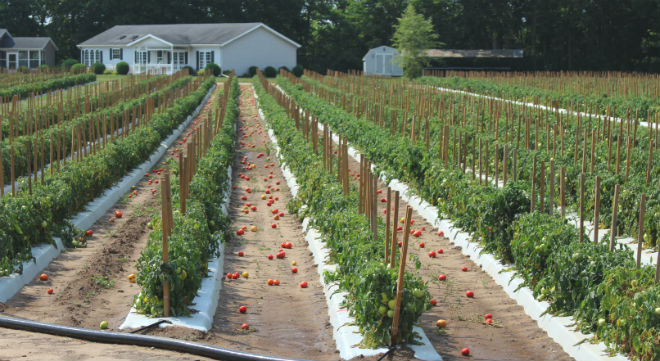Mar 27, 2019US growers, Mexican tomato importers spar over trade
Call it a tomato fight.
Uncertainty over the U.S. trade policy on fresh tomatoes imported from Mexico is prompting a war of words between produce industry groups representing both sides of the border.
The U.S. Department of Commerce (USDOC) is set to withdraw on May 7 from the 2013 Suspension Agreement on Fresh Tomatoes from Mexico. The agreement for decades has put off a U.S. investigation of Mexico-grown fresh tomatoes being dumped in the U.S.
In international trade terms, dumping means selling a product in a foreign market at a price lower than the domestic price – in this circumstance, it would mean selling Mexican tomatoes in the U.S. at a lower rate than they are sold in Mexico.
The USDOC’s first agreement with growers and exporters of fresh Mexico-grown tomatoes dates came in 1996, and other agreements followed in 2002, 2008 and 2013. USDOC and those signatories negotiated in January 2018 but “significant outstanding issues” prevented them from crafting a new agreement.
In November 2018, the Florida Tomato Exchange (FTE) alleged dumping of Mexico-grown tomatoes in the American market and asked for the suspension agreement to be dropped.
The Department of Commerce’s decision to do so was also preceded by an open letter from bipartisan members of the U.S. Congress from 12 states.
“Since the first tomato suspension agreement was enacted in 1996, hundreds of U.S. tomato growers across the country have been forced out of business,” according to the letter. Sen. Marco Rubio, R-Florida, and other Republican members of the Florida delegation have continued to issue statements about the issue.
“The data is overwhelmingly clear, Mexico has been waging an assault on southeastern tomato producers for years – and getting away with it,” Rep. Neal Dunn, R-Florida, said in a press release.
One of the voices in favor of the Tomato Suspension Agreement has been the Fresh Produce Association of the Americas (FPAA). Based in Nogales, Arizona, it describes itself as “an association of U.S. importers and allied companies involved in the importation and distribution of fresh produce, primarily from Mexico.”
A March 11 letter from FPAA to USDOC minced few words, saying that FPAA members were being “besieged by a handful of wealthy Florida tomato grower/importers intent on reducing competition from their U.S. import competitors.”
But that characterization didn’t sit well with the opposition.
“The first thing I would note is that this is not just about Florida,” Florida Tomato Exchange Executive Vice President Michael Schadler said in an email to Vegetable Growers News. In a news release, the Exchange wrote that “at a hearing on this matter before the U.S. International Trade Commission, the domestic tomato industry was represented by six tomato growers with operations spanning California, Michigan, Tennessee, Georgia, Virginia, and Florida. Only two of those six growers have production in Florida.”
According to a witness list for the hearing, witnesses in support of an antidumping duty order included Schadler, as well as individuals from Sunripe Certified Brands, DiMare Homestead, West Coast Tomato Growers, Leitz Farms and SunSelect, Produce California.
In its letter to the USDOC, FPAA even went after Florida tomato growers’ practices, including ethylene ripening.
“By their own choice, farmers from Florida continue to grow gassed-green tomatoes, an innovation from before World War II that now is decades behind newer production methods,” according to the FPAA letter. “Most of Florida’s tomatoes are picked green, then artificially ‘de-greened’ in gas rooms that have been injected with ethylene gas. These gassed tomatoes have less flavor than vine-ripened tomatoes grown in most other growing regions in and around the United States.”
Schadler disagreed with the validity of those claims.
“I would note that the use of ethylene ripening rooms is common practice across the fresh produce industry, including bananas, avocados, pears, stone fruit, mangoes, and others,” Schadler said. “In Florida, we grow both mature green tomatoes and vine-ripe tomatoes, just as there are mature green and vine-ripe tomatoes being grown in all major tomato-producing states. At this point, vine-ripe growers are even more impacted by cheap Mexican imports than the mature green growers are.”
FPAA also claimed the Florida area wasn’t conducive to growing tomatoes, citing information from the controversial 2011 book TomatoLand. It also quoted a University of Florida Institute of Food and Agricultural Sciences Extension paper – originally published in 2007, but updated as recently as October 2017 – that said because of various challenges to Florida growing, “pepper and tomato production in Florida is now primarily controlled by a relatively small number of large corporate agribusinesses that have the ability to spread risk between multiple production centers and the resources to endure the adversity of a poor market year or years.”
FPAA President Lance Jungmeyer provided a press release and copy of the FPAA letter, but by press time had not responded to repeated questions about Mexican growing conditions for tomatoes. (Update: He responded the day after this was published; read his responses here.)
“This is nonsense and a distraction from the real issues,” Schadler said of the FPAA claims about Florida growing conditions. “The Commerce Department and the ITC (International Trade Commission) will make their judgments in this case on whether dumping has occurred and whether that dumping has injured the domestic industry. Period.”
– Stephen Kloosterman, Associate Editor
Above: Fred Leitz and his three brothers grow cucumbers, cantaloupe, blueberries, apples and tomatoes on 700 acres near Sodus, Michigan. Photo: Stephen Kloosterman















